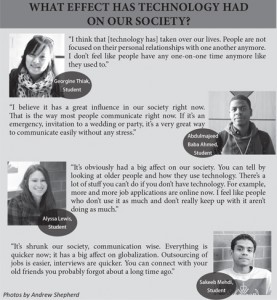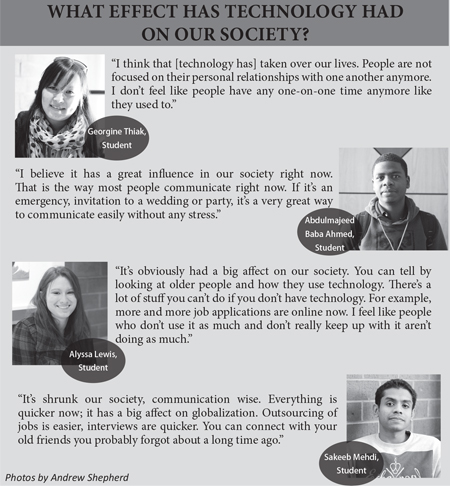By David Hurtado
At its inception, the telegraph made little direct impact on most people’s lives. It was a ‘specialist’ technology, owned by companies and operated by professionals, but the indirect impact of the telegraph was substantial.

Today, telecommunications technology has advanced exponentially since Samuel Morse sent the first telegraph message in 1844. Humans can communicate instantly from anywhere on the planet via texting, Facebook, Skype and other mediums. But as technology changes over time, so does society.
Deana Miller, professor, Speech, said she sees texting among younger students out in the hallways after class frequently instead of interacting with people next to them. Miller said she believes this has a negative impact on learning to initiate conversation with other people.
“In some specific young people that I know, if you say call and order a pizza, they’ll say, ‘No, I can do that online. Why would I call and talk to somebody if I can do that online?’” she said. “It is a skill to learn to talk to people and initiate a conversation. It’s easier to do it online or to text. I think that can have a negative impact because you have to learn that skill and practice it.”
Miller said the average American spends an average of 18 hours per week online and 87 percent of teenagers sleep with their cell phone right beside them.
However, she noted this change in the way we communicate is not all bad. If a family member is needed for an emergency, they can be reached quicker than they could have 100 years ago. Likewise, people who live on opposite sides of the world can keep in touch easily.
Toby Klinger, professor, Psychology, said humans crave electronic devices in a similar manner to Pavlov’s experiment with dogs in classical conditioning and B.F. Skinner’s theory of operant conditioning.
“It gives us information and instant social connection,” Klinger said. “That’s what humans crave, is that connection with others and instant gratification in terms of getting information and responses.”
According to a survey conducted by TeleNav, a technology company, more than half of Americans would rather give up chocolate, alcohol and caffeine for a week than temporarily part with their phones.
Klinger said brain wise; the research shows a change in people’s dopamine circuits. She said there could be more motivation behind being connected with other people. Even if it’s not real interaction, some people have more drive behind that than a stimulant like chocolate, gambling or even sex.
Klinger said according to the DSM-V (Diagnostic and Statistical Manual of Mental Disorders), more research needs to be done before we can know what behavioral problems might stem from an individual’s addiction to technological devices.
“The DSM-V, which helps clinical folks diagnose people if they have a problem, is putting in internet videogames,” she said. “I assume it’s going to increase in terms of how they define the social media stuff as a potential problem, especially in young folks.”
William McFarlane, associate professor and chair, Anthropology, said it’s important to recognize the effect advances in telecommunications technology has had on our society is not inherently bad or good. He said it is how people use technology and the way it impacts us as individuals and how that allows us to interact with each other.
“I think a good place to start is to recognize that making and using tools is something that’s absolutely inherent in humanity; the foundation of what it means to be human,” McFarlane said. “We’ve been doing this for 3.2 million years, making and using tools. I think there’s a tendency to think about technology in really stark good or bad terms.”
McFarlane said in some instances, the introduction of new technology has led to the downfall of certain civilizations. He said this is mostly in the case of colonialism where an advanced technology disrupts the existing social fabric of a people. However, there are some cases where new technology was held exclusively by a few individuals which negatively impacted their society.
“There are a few examples that we can see where societies have fallen apart as a result of the introduction of new technologies,” he said. “But these new technologies are things that are made out of materials that are rare, and therefore are held exclusively by some individuals. As these individuals take on the new technology or these new, rare resources, it destabilizes the relationships between everybody in that society.”
He also added it is “highly unlikely” our phones will rise up and destroy our society from within.
As the nature of warfare has continued to evolve since man first discovered the killing power of rock and bone, so too have telecommunications since the telegraph. Miller said she believes social media and texting are here to stay as means of communication.
“This is just my guess, but I think we’re going to continue down this path for a while,” she said. “It’s become more and more common and it’s easy to pick it up. Hopefully, we won’t lose the art of conversation. It’s really sad because you want to be able to sit down and enjoy conversation with someone.
“You have some of that online, but so much can get lost,” she continued. “In order to be able to read a message, you need to be able to hear the tone of voice, see the eye contact, the facial expression and the posture. Sarcasm in texting– how do you know someone’s being sarcastic when they’re texting? Without those emoticons, that some people don’t use, that’s lost.”
Contact David Hurtado, features editor, at dhurtado@jccc.edu.






















